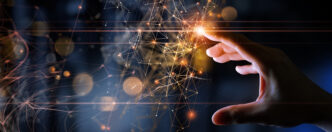Imagine spending your life contained inside an opaque bubble. Everything that you need — or, at least, everything that you think that you need — is there in the bubble with you.
You were placed within the bubble when you were born, and since the day of your birth you’ve never had any interaction with the world outside of the bubble. In fact, the bubble is your cosmos — the bounds of your existence.
Your bubble is one of significant magnitude — large enough that you have to strain to see the horizon. And within your bubble, there’s much to look at, to interact with, to explore. You’ve been writing for years about your life and your experiences, and every once in a while you go back and read what you’ve written, and it seems to you that what you’ve written is accurate, complete and true to your experience. And your experience is, of course, all that you have.
Since your bubble is opaque, you can’t glimpse beyond it, and indeed the very concept of “the bubble” is meaningless, because not knowing that there is anything beyond it, you aren’t actually aware that you live within a bubble.
The bubble of AI
To a certain extent, every one of us lives within such a bubble, defined by the bounds of his or her experience and imagination. And for some, their bubbles are self-constructed or at least more or less consciously (and thus more or less willfully) adopted, and we might call those bubbles ideologies, but that’s a subject for another day.
Today, we’re considering something different — not a person at all, but an AI chatbot. In this story, you are the AI, and it has been trained on everything inside of your bubble, and only on that. The totality of all of that training material is the cosmos of the AI: It’s the bubble itself. And just like you, the AI doesn’t know — can’t possibly know — that the bubble exists as a finite limit on its knowledge and experience.
Like you, the AI does a lot of writing. In fact, it writes a lot more than you, because while there are finite limits on how fast it can write, those limits are, in practical terms, essentially infinite compared with the limits of a human hand holding a pen or typing on a keyboard. And yet … everything that the AI writes is something that you could have written. Its “experience” (its training) is confined to the same cosmos that you inhabit. It cannot cross the boundary of that cosmos — go beyond the bubble — any more than you can.
Except: What the AI does not “know,” and what you may not know, either, is that you actually can — and, even if you don’t know it, routinely do — travel beyond the boundary of your cosmos. Because you are a person, made in the image and likeness of God, which means not only that you are endowed with a soul that the AI will never have but that you are capable of taking part in the spiritual life of God that exists not only within but beyond everything that you can see, hear, taste, touch and smell.
Created by God
And part of that spiritual life — the very essence of our participation in the life of God — is the ability to create. Not to ring endless changes on everything that God has already created, or merely to combine — as an AI does — the elements of our cosmos into probabilistically likely combinations of what we’ve previously experienced through our five senses, but to create new meaning by viewing the world not through human eyes but through eyes enlightened by our Creator.
We can, in other words, move beyond our bubble, to become more than ourselves — or, rather, to become the selves that we were always meant to be, because we were created by God and redeemed by his Son and sanctified by his Holy Spirit — all realities in which no AI can ever share, no matter how much it might, through a combination of increasing accuracy and (ironically) “hallucination,” come to mimic human consciousness.
This is the truth about AI that the Church needs to speak. That, so far, the Church has failed to do so clearly and forcefully is all the more ironic because it is the truth that Christ revealed about humanity — a truth that, for five centuries and more, the modern world has, more and more successfully, expelled from the mental bubble in which we live.








